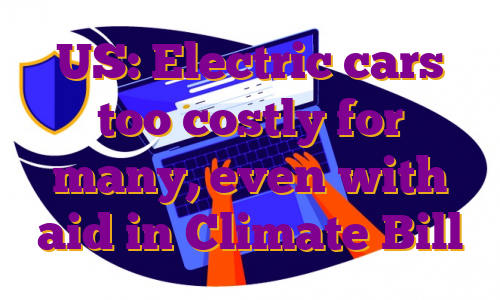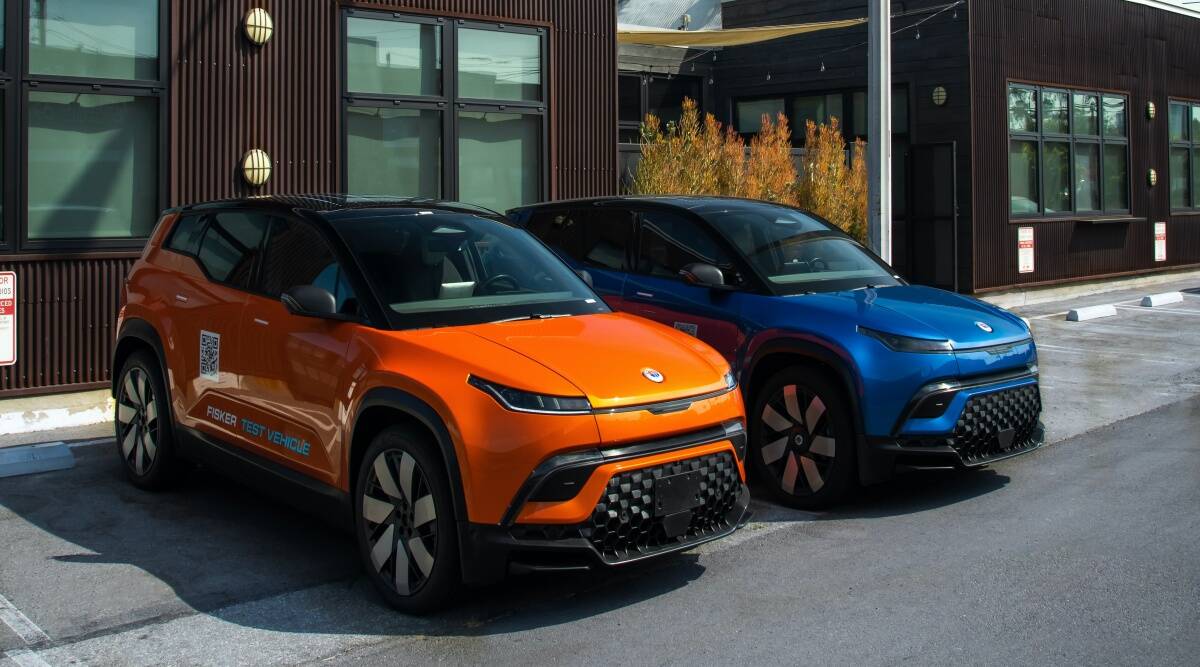Policymakers in Washington are promoting electric vehicles as a solution to climate change. But an uncomfortable truth remains: Battery-powered cars are much too expensive for a vast majority of Americans.
Congress has begun trying to address that problem. The climate and energy package passed Sunday by the Senate, the Inflation Reduction Act, would give buyers of used electric cars a tax credit.
But automakers have complained that the credit would apply to only a narrow slice of vehicles, at least initially, largely because of domestic sourcing requirements. And experts say broader steps are needed to make electric cars more affordable and to get enough of them on the road to put a serious dent in greenhouse gas emissions.
High prices are caused by shortages of batteries, of raw materials like lithium and of components like semiconductors. Strong demand for electric vehicles from affluent buyers means that carmakers have little incentive to sell cheaper models. For low- and middle-income people who don’t have their own garages or driveways, another obstacle is the lack of enough public facilities to recharge.
The bottlenecks will take years to unclog. Carmakers and suppliers of batteries and chips must build and equip new factories. Commodity suppliers have to open new mines and build refineries. Charging companies are struggling to install stations fast enough. In the meantime, electric vehicles remain largely the province of the rich.
To some extent, the carmakers are following their usual game plan. They have always introduced new technology at a luxury price. With time, the features and gadgets make their way into cheaper cars.
But emission-free technology has an urgency that voice navigation or massaging seats did not. Transportation accounts for 27% of greenhouse gas emissions in the United States, according to the Environmental Protection Agency. Battery-powered cars produce far less carbon dioxide than vehicles that run on gasoline or diesel. That is true even accounting for the emissions from generating electricity and from manufacturing batteries, according to numerous studies.
Only a few years ago analysts were predicting that electric vehicles would soon be as cheap to buy as gasoline cars. Given the savings on fuel and maintenance, going electric would be a no-brainer.
Instead, soaring prices of commodities like lithium, an essential ingredient in batteries, helped raise the average sticker price of an electric vehicle by 14% last year to $66,000, $20,000 more than the average for all new cars, according to Kelley Blue Book.
Demand for electric vehicles is so strong that models like the Ford Mach-E are effectively sold out, and there are long waits for others. Tesla’s website informs buyers that they can’t expect delivery of a Model Y, with a purchase price of $66,000, until sometime between January and April 2023.
With so much demand, carmakers have little reason to target budget-minded buyers. Economy car stalwarts like Toyota and Honda are not yet selling significant numbers of all-electric models in the United States. Scarcity has been good for Ford, Mercedes-Benz and other carmakers that are selling fewer cars than before the pandemic but recording fat profits.
Automakers are “not giving any more discounts because demand is higher than the supply,” said Axel Schmidt, a senior managing director at Accenture who oversees the consulting firm’s automotive division. “The general trend currently is no one is interested in low prices.”
Advertised prices for electric vehicles tend to start around $40,000, not including a federal tax credit of $7,500. Good luck finding an electric car at that semi-affordable price.
Ford has stopped taking orders for Lightning electric pickups, with an advertised starting price of about $40,000, because it can’t make them fast enough. Hyundai advertises that its electric Ioniq 5 starts about $40,000. But the cheapest models available from dealers in the New York area, based on a search of the company’s website, were around $49,000 before taxes.
Tesla’s Model 3, which the company began producing in 2017, was supposed to be an electric car for average folks, with a base price of $35,000. But Tesla has since raised the price for the cheapest version to $47,000.
Even used electric cars are scarce. Popular models like the Tesla Y and Ford Mach-E are sometimes selling for thousands of dollars more used than they did new. Buyers are willing to pay a premium to get an electric car, even a used one, right away.
Joshua Berliner, a Los Angeles entrepreneur, was in the market for a used Tesla Model 3 sedan but discovered that prices were higher than for a new Tesla. “The same held true for nearly every make we looked at,” Berliner said in an email.
Berliner, who owns a Tesla and wanted a second one for his wife, said he had become so desperate that he almost bought a gasoline car. “I normally wouldn’t consider combustion vehicles, but if gas prices were lower I might have pulled the trigger,” he said.
The Inflation Reduction Act, which appears likely to pass the House, would give buyers of used cars a tax credit of up to $4,000. The used-car market is twice the size of the new-car market and is where most people get their rides.
But the tax credit for used cars would apply only to those sold for $25,000 or less. Less than 20% of used electric vehicles fit that category, said Scott Case, CEO of Recurrent, a research firm focused on the used-vehicle market.
The supply of secondhand vehicles will grow over time, Case said. He noted that the Model 3, which has sold more than any other electric car, became widely available only in 2018. New-car buyers typically keep their vehicles three or four years before trading them in.
A $7,500 credit for new electric vehicles, another provision of the Inflation Reduction Act, would help push down prices across the board and filter down to the used-car market, Case said. Carmakers sold nearly 200,000 new electric vehicles in the United States from April through June. As those new cars age, used electric vehicles will become “accessible to a lot more people,” Case said.
🚨 Limited Time Offer | Express Premium with ad-lite for just Rs 2/ day 👉🏽 Click here to subscribe 🚨
The problem is that many new electric cars may not qualify for the $7,500 credits. The Inflation Reduction Act sets standards for how much of a car’s battery must be made in North America with raw materials from trade allies. Several car manufacturers and suppliers have announced plans to build battery factories in the United States, but few have begun producing.
“Right now with our lack of capacity for materials, I don’t think there is any product that will meet that today,” Carla Bailo, president of the Center for Automotive Research in Ann Arbor, Michigan, said of the standards. “Tesla is probably close but the rest of the manufacturers, no way.”
The legislation also excludes imported electric vehicles from the tax credit. The provision is designed to protect American jobs but would undercut the price advantage of Chinese brands that are expected to enter the United States. SAIC’s MG unit sells an electric SUV in Europe for about $31,000 before incentives.
Eventually, Bailo said, carmakers will run out of well-heeled buyers and aim at the other 95%.
“They listen to their customers,” she said. “Eventually that demand from high-income earners is going to abate.”
!function(f,b,e,v,n,t,s)
{if(f.fbq)return;n=f.fbq=function(){n.callMethod?
n.callMethod.apply(n,arguments):n.queue.push(arguments)};
if(!f._fbq)f._fbq=n;n.push=n;n.loaded=!0;n.version=’2.0′;
n.queue=[];t=b.createElement(e);t.async=!0;
t.src=v;s=b.getElementsByTagName(e)[0];
s.parentNode.insertBefore(t,s)}(window, document,’script’,
‘https://connect.facebook.net/en_US/fbevents.js’);
fbq(‘init’, ‘444470064056909’);
fbq(‘track’, ‘PageView’);
.




